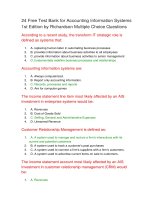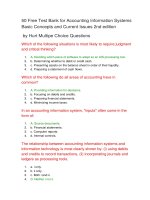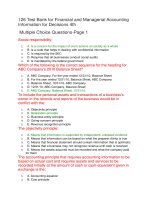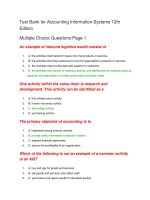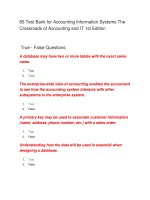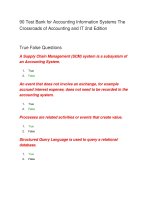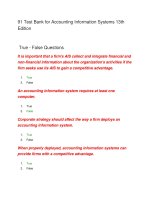49 test bank for managerial accounting 10th edition
Bạn đang xem bản rút gọn của tài liệu. Xem và tải ngay bản đầy đủ của tài liệu tại đây (37 KB, 10 trang )
49 Test Bank for Managerial Accounting 10th Edition
by Hilton Multiple Choice Questions
A controller is normally involved with:
1.
2.
3.
4.
5.
A. preparing financial statements.
B. managing investments.
C. raising capital.
D. safeguarding assets.
E. managing the firm's credit policy.
Which of the following typically does not relate to the role of a
controller?
1.
2.
3.
A. A controller supervises the accounting department.
B. A controller safeguards an organization's assets.
C. A controller oversees the preparation of reports required by
governmental authorities.
4. D. A controller normally assumes a narrow role within the organization,
often preventing the
5. individual's rise to top management ranks.
6. E. A controller safeguards an organization's assets and a controller
normally assumes a narrow role within the organization, often preventing the
individual's rise to top management ranks.
Which of the following acts strives to improve corporate
governance and the quality of corporate accounting/reporting?
1.
2.
3.
4.
5.
A. Robinson-Patman.
B. Taft-Hartley.
C. Sarbanes-Oxley.
D. Bush-Cheney.
E. Franks-Ashcroft.
Assume that a managerial accountant regularly communicates
with business associates to avoid conflicts of interest and advises
relevant parties of potential conflicts. In so doing, the accountant
will have applied the ethical standard of:
1.
2.
3.
4.
5.
A. objectivity.
B. confidentiality.
C. integrity.
D. credibility.
E. unified behavior.
Strategic cost management is:
1.
A. the process of determining cost drivers.
2.
B. the recognition of the importance of cost relationships among the
activities in the value chain.
3. C. the process of managing cost relationships to the firm's advantage.
4. D. two of the other answers are correct.
Which of the following managerial functions involves a detailed
financial and operational description of anticipated operations?
1.
2.
3.
4.
5.
A. Decision making.
B. Planning.
C. Directing operational activities.
D. Controlling.
E. Measuring.
Which of the following choices correctly depicts activities that
would be included in a manufacturer's value chain?
1.
2.
3.
4.
5.
A. Research and development: Yes, marketing: Yes, distribution: No
B. Research and development: Yes, marketing: No, distribution: Yes
C. Research and development: Yes, marketing: Yes, distribution: Yes
D. Research and development: No, marketing: Yes, distribution: No
E. Research and development: No, marketing: Yes, distribution: Yes
The capacity concept that allows for normal occurrences such as
machine downtime and employee fatigue is known as:
1.
2.
3.
4.
5.
A. practical capacity.
B. theoretical capacity.
C. utilized capacity.
D. management capacity.
E. capacity maximization.
Which of the following employees at Delta Airlines would not be
considered as holding a line position?
1.
2.
3.
4.
5.
A. Pilot.
B. Chief financial officer (CFO).
C. Flight attendant.
D. Ticket agent.
E. Baggage handler.
Managerial accounting:
1.
2.
3.
4.
5.
A. focuses only on historical data.
B. is governed by GAAP.
C. focuses primarily on the needs of personnel within the organization.
D. provides information for parties external to the organization.
E. focuses on financial statements and other financial reports.
Given the following information, what is the cost of unused
capacity? Cost of material supplied is $3,200; Cost of material
used is $3,000; Cost of material used per cake is $3; Cost of
material supplied per cake is $3.20.
1.
2.
3.
4.
5.
A. $0.20.
B. $200.
C. $2,000.
D. $1,000.
E. There is no unused capacity.
Which of the following is not an element of competency?
1.
2.
3.
4.
A. To develop appropriate knowledge about a particular subject.
B. To perform duties in accordance with relevant laws.
C. To perform duties in accordance with relevant technical standards.
D. To refrain from engaging in an activity that would discredit the accounting
profession.
5. E. To prepare clear reports after an analysis of relevant and reliable
information.
Which of the following employees at Starbucks would likely be
considered as holding a staff position?
1.
2.
3.
4.
5.
A. The company's chief operating officer (COO).
B. The manager of a store located in Kansas City, Missouri.
C. The company's lead, in-house attorney.
D. The company's chief financial officer (CFO).
E. The company's lead, in-house attorney and the company's chief financial
officer (CFO).
Given the following information, what is the cost of unused
capacity? Cost of material supplied is $8,600; Cost of material
used is $8,000; Cost of material used per shelf is $8; Cost of
material supplied per shelf is $8.60.
1.
2.
3.
4.
5.
A. $600.
B. $6,000.
C. $0.60.
D. $1,000.
E. There is no unused capacity.
Which of the following statements about the ethical climate of
business is false?
1.
A. Greedy corporate executives are, in part, to blame for the rash of
corporate scandals that occurred not too long ago.
2. B. Unethical business behavior can have a negative impact on our
economy.
3.
C. The Sarbanes-Oxley Act strives to improve the overall quality of
corporate reporting.
4. D. The Robinson-Patman Act strives to improve the overall quality of
corporate reporting.
5. E. Corporate scandals have served as the accounting profession's wake-up
call to pay increased attention to ethical issues in the conduct of business.
Financial accounting focuses primarily on reporting:
1.
2.
3.
4.
5.
A. to parties outside of an organization.
B. to parties within an organization.
C. to an organization's board of directors.
D. to financial institutions.
E. for financial institutions.
The cost of resources supplied but unused is known as:
1.
2.
3.
4.
5.
A. practical capacity costs.
B. the cost of theoretical capacity.
C. the cost of unused capacity.
D. the cost of resources supplied.
E. capacity cost.
Which of the following characteristic(s) relate(s) more to
managerial accounting than to financial accounting?
1.
2.
3.
4.
A. A focus on reporting to personnel within an organization.
B. A focus on reporting to external parties.
C. An area of accounting that is heavily regulated.
D. A focus on providing information that is relevant for planning, decision
making, directing, and control.
5. E. A focus on reporting to personnel within an organization and a focus on
providing information that is relevant for planning, decision making, directing,
and control.
Which of the following involves the coordination of daily business
functions within an organization?
1.
2.
3.
4.
5.
A. Decision making.
B. Planning.
C. Directing operational activities.
D. Controlling.
E. Motivating.
The process of encouraging and authorizing workers to take
appropriate initiatives to improve the overall firm is commonly
known as:
1.
2.
A. planning and control.
B. employee empowerment.
3.
4.
5.
C. personnel aggressiveness.
D. decision making.
E. problem recognition and solution.
Taurus Company has set various goals, and management is now
taking appropriate action to ensure that the firm achieves these
goals. One such action is to reduce outlays for overhead, which
have exceeded budgeted amounts. Which of the following
functions best describes this process?
1.
2.
3.
4.
5.
A. Decision making.
B. Planning.
C. Coordinating.
D. Controlling.
E. Organizing.
All of the following entities would have a need for managerial
accounting information except:
1.
2.
3.
4.
5.
A. the state of Michigan.
B. Google.
C. Abercrombie & Fitch.
D. H&R Block.
E. None of these responses is correct, as all of these entities would use
managerial accounting information.
The day-to-day work of management teams will typically comprise
all of the following activities except:
1.
2.
3.
4.
5.
A. decision making.
B. planning.
C. cost minimizing.
D. directing operational activities.
E. controlling.
Which of the following statements about managerial accountants
is false?
1.
2.
3.
4.
5.
A. Managerial accountants more and more are considered "business
partners."
B. Managerial accountants often are part of cross-functional teams.
C. An increasing number of organizations are segregating managerial
accountants in separate managerial-accounting departments.
D. In a number of companies, managerial accountants make significant
business decisions and resolve operating problems.
E. The role of managerial accountants has changed considerably over the
past decade.
Which of the following can be linked to a wave of corporate
scandals that took place not too long ago?
1.
2.
3.
4.
5.
A. Greedy corporate executives.
B. Managers who made over-reaching business deals.
C. Lack of oversight by companies' audit boards and boards of directors.
D. Shoddy work by external auditors.
E. All of these.
Which of the following is not an ethical standard of managerial
accounting?
1.
2.
3.
4.
5.
A. Competence.
B. Confidentiality.
C. Efficiency.
D. Integrity.
E. Credibility.
Which of the following perspectives is normally absent in a
balanced scorecard?
1.
2.
3.
4.
5.
A. Financial.
B. Customer.
C. Internal operations.
D. Learning and innovation/growth.
E. None of these.
The role of managerial accounting information in assisting
management is a(n):
1.
2.
3.
4.
5.
A. financial-directing role.
B. attention-directing role.
C. planning and controlling role.
D. organizational role.
E. problem-solving role.
Which of the following would likely be considered an internal user
of accounting information rather than an external user?
1.
2.
3.
4.
5.
A. Stockholders.
B. Consumer groups.
C. Lenders.
D. Middle-level managers.
E. Government agencies.
In order for a company to achieve a sustainable competitive
advantage, it must:
1.
A. perform one or more activities in the value chain at the same quality level
as its competitors.
2.
B. perform all activities in the value chain at the same quality level as its
competitors.
3. C. perform its value chain activities at a higher quality level than one of its
competitors.
4. D. two of the answers are correct.
Which of the following employees would be considered as holding
a line position?
1.
2.
3.
4.
5.
A. Exxon Corporation's vice-president for government relations.
B. The controller of General Motors.
C. A secretary employed by Verizon Communications.
D. The manager of food and beverage services at Disney's Magic Kingdom.
E. None of the other answers are correct.
The upper limit on the production of goods and services if
everything works perfectly is known as:
1.
2.
3.
4.
5.
A. practical capacity.
B. theoretical capacity.
C. utilized capacity.
D. management capacity.
E. capacity maximization.
Cost management systems tend to focus on an organization's:
1.
2.
3.
4.
5.
A. machines.
B. employees.
C. activities.
D. customers.
E. rules and regulations.
Managerial accountants:
1.
2.
3.
4.
5.
A. often work on cross-functional teams.
B. are located throughout an organization.
C. are found primarily at lower levels of the organizational hierarchy.
D. are found primarily at higher levels of the organizational hierarchy.
E. often work on cross-functional teams and are located throughout an
organization.
Which of the preceding activities would likely not be considered
part of The Gap clothing company's value chain?
1.
2.
3.
4.
5.
A. Designing a new product line.
B. Locating and then negotiating terms with a clothing manufacturer.
C. Marketing an existing product line.
D. Distributing goods from regional warehouses to local stores.
E. All of these activities would be an element in the company's value chain.
The process of managing the various activities in the value chain,
along with the associated costs, is commonly known as:
1.
2.
3.
4.
5.
A. activity-based costing.
B. strategic cost management.
C. total quality management.
D. computer-integrated costing.
E. sound management practices (SMP).
Which of the following business models considers financial,
customer, internal operating, and other measures in the
evaluation of performance?
1.
2.
3.
4.
5.
A. Deterministic simulation.
B. Balanced scorecard.
C. Payoff matrix.
D. Decision tree.
E. Chart of operating performance (COP).
In order for a company to achieve a sustainable competitive
advantage, it must perform value chain activities:
1.
2.
3.
4.
5.
A. at the same quality level as competitors, at the same cost.
B. at the same quality level as competitors, but at a lower cost.
C. at a higher quality level than competitors, at a higher cost.
D. at a higher quality level than competitors, but at no greater cost.
E. at the same quality level as competitors, but at a lower cost or at a
higher quality level than competitors, but at no greater cost.
A restaurant's value chain includes:
1.
2.
3.
4.
5.
A. only the restaurant.
B. only upstream contributors.
C. only downstream contributors.
D. all of the other answers.
E. both up and downstream contributors.
Which of the following choices correctly depicts whether
McDonald's, the University of Wisconsin, and Apple Inc. would
have a need for managerial accounting?
1.
2.
3.
4.
5.
A. University of McDonald's: Yes, University Wisconsin: Yes, Apple Inc.: No
B. University of McDonald's: Yes, University Wisconsin: No, Apple Inc.: Yes
C. University of McDonald's: Yes, University Wisconsin: Yes, Apple Inc.: Yes
D. University of McDonald's: No, University Wisconsin: Yes, Apple Inc.: No
E. University of McDonald's: No, University Wisconsin: Yes, Apple Inc.: Yes
Employee empowerment involves encouraging and authorizing
workers to take initiatives to:
1.
2.
3.
4.
5.
A. improve operations.
B. reduce costs.
C. improve product quality.
D. improve customer service.
E. All of the other answers are correct.
The chief managerial and financial accountant of an organization
is the:
1.
2.
3.
4.
5.
A. chief executive officer (CEO).
B. treasurer.
C. vice-president of accounting.
D. internal auditor.
E. chief financial officer (CFO).
Managerial accounting:
1.
2.
3.
4.
5.
A. is unregulated.
B. produces information that is useful only for manufacturing organizations.
C. is based exclusively on historical data.
D. is regulated by the Securities and Exchange Commission (SEC).
E. generally focuses on reporting information about the enterprise in its
entirety rather than by subunits.
The value chain of a manufacturer would tend to include activities
related to:
1.
2.
3.
4.
5.
A. manufacturing.
B. research and development.
C. product design.
D. marketing.
E. All of the other answers are correct.
Which of the following statements represents a similarity between
financial and managerial accounting?
1.
2.
3.
4.
5.
A. Both are useful in providing information for external users.
B. Both are governed by GAAP.
C. Both draw upon data from an organization's accounting system.
D. Both rely heavily on published financial statements.
E. Both are solely concerned with historical transactions.
Which if the following would not be part of a value chain for a fast
food restaurant?
1.
2.
3.
4.
5.
A. All of the answers are a part of the value chain.
B. Buying produce.
C. Mopping the floor.
D. Refilling the napkin dispensers.
E. Hiring new cooks.
Which of the following functions is best described as choosing
among available alternatives?
1.
2.
3.
4.
5.
A. Decision making.
B. Planning.
C. Directing operational activities.
D. Controlling.
E. Budgeting.
Which of the following is not a function of the treasurer?
1.
2.
3.
4.
5.
A. Safeguarding assets.
B. Managing investments.
C. Preparing financial statements.
D. Being responsible for an entity's credit policy.
E. Raising capital.
Which of the following is not an objective of managerial
accounting?
1.
2.
3.
4.
5.
A. Providing information for decision making and planning.
B. Assisting in directing and controlling operations.
C. Maximizing profits and minimizing costs.
D. Measuring the performance of managers and subunits.
E. Motivating managers toward the organization's goals.
